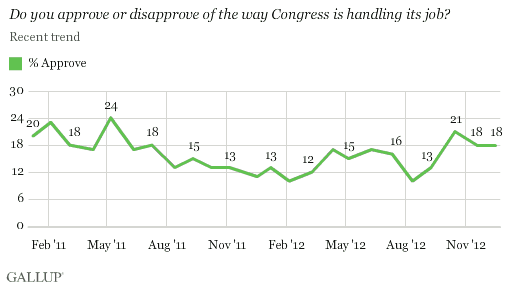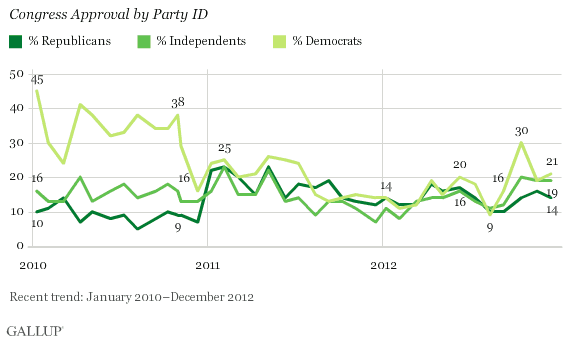WASHINGTON, D.C. -- Eighteen percent of Americans approve of the job Congress is doing, as leaders continue to work toward a solution to the looming fiscal cliff. That approval rating is unchanged from last month, but remains low from a historical perspective.

The results are based on a Dec. 14-17 USA Today/Gallup poll. Congressional job approval remains improved from the record-low 10% approval rating Gallup recorded in February and August of this year. This month's 18% approval ties November's reading for the second-highest rating of 2012. But it is still below Congress' 33% average approval rating across Gallup's full trend since 1974.
The unchanged evaluation of Congress over the past two months is consistent with Americans' steady economic confidence and their stable views on the fiscal cliff negotiations.
Gap Between Democrats' and Republicans' Approval of Congress Widens
Republicans' approval of Congress fell slightly to 14% from 16% in November, while Democrats' approval increased slightly to 21% from 19%. The resulting seven-point partisan gap in approval of Congress is the largest measured since June 2011, with the exception of the 16-point gap prior to the election in October of this year.
This slight increase in the partisan gap may reflect that Democrats are more positive about their congressional party leaders' handling of the fiscal cliff negotiations than Republicans are about their party leaders. Independents' ratings of Congress remain unchanged in December at 19%.

Bottom Line
Americans' approval of Congress continues to be low from a historical perspective, but has remained steady at 18% amid the fiscal cliff negotiations. The division of power in Congress, failure to compromise on key legislative issues, and the public's perception of low honesty and ethics likely contribute to this long-lasting slump in Congress' approval.
However, with 62% of Americans paying at least somewhat close attention to the fiscal cliff negotiations and 66% of Americans wanting government leaders to compromise to reach an agreement by Jan. 1, Congress' job approval could fall significantly if the "cliff" is not avoided by the deadline.
Survey Methods
Results for this USA Today/Gallup poll are based on telephone interviews conducted Dec. 14-17, 2012, with a random sample of 1,025 adults, aged 18 and older, living in all 50 U.S. states and the District of Columbia.
For results based on the total sample of national adults, one can say with 95% confidence that the maximum margin of sampling error is ±4 percentage points.
Interviews are conducted with respondents on landline telephones and cellular phones, with interviews conducted in Spanish for respondents who are primarily Spanish-speaking. Each sample includes a minimum quota of 400 cellphone respondents and 600 landline respondents per 1,000 national adults, with additional minimum quotas among landline respondents by region. Landline telephone numbers are chosen at random among listed telephone numbers. Cellphone numbers are selected using random-digit-dial methods. Landline respondents are chosen at random within each household on the basis of which member had the most recent birthday.
Samples are weighted by gender, age, race, Hispanic ethnicity, education, region, adults in the household, population density, and phone status (cellphone only/landline only/both, cellphone mostly, and having an unlisted landline number). Demographic weighting targets are based on the March 2011 Current Population Survey figures for the aged 18 and older population living in U.S. All reported margins of sampling error include the computed design effects for weighting.
In addition to sampling error, question wording and practical difficulties in conducting surveys can introduce error or bias into the findings of public opinion polls.
View methodology, full question results, and trend data.
For more details on Gallup's polling methodology, visit https://www.gallup.com/.
